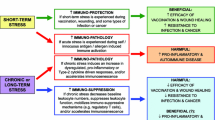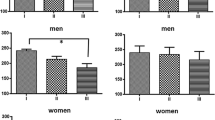Abstract
This study was done to determine the effect of stress on blood glucose regulation in ICR mice. The stress was induced by the electrical foot shock-witness model. Blood glucose level was found to be increased in the electrical foot shock-induced physical stress group. Furthermore, the blood glucose levels were also elevated in the emotional stress group in both physical and emotional stress groups. The blood glucose level reached maximum 30 min after stress stimulation and returned to normal level 2 h after stress stimulation in both physical and emotional stress groups. Subsequently, we observed that intraperitoneal injection of phentolamine (an α1-adrenergic receptor antagonist), yohimbine (an α2-adrenergic receptor antagonist) or RU486 (a glucocorticoid receptor blocker) significantly inhibited blood glucose level induced by both physical and emotional stress. The results of our study suggest that physical and emotional stress increases blood glucose level via activation of adrenergic and glucocorticoid system.
Similar content being viewed by others
References
Amano, M., Suemaru, K., Cui, R., Umeda, Y., Li, B., Gomita, Y., Kawasaki, H., and Araki, H., Effects of Physical and Psychological Stress on 5-HT2A Receptor-mediated Wetdog Shake Responses in Streptozotocin-induced Diabetic Rats. Acta Med. Okayama, 61, 205–212 (2007).
Cox, R. H., Hubbard, J. W., Lawler, J. E., Sanders, B. J., and Mitchell, V. P., Cardiovascular and sympathoadrenal responses to stress in swim-trained rats. J. Appl. Physiol., 58, 1207–1214 (1985).
De Boer, S. F., Koopmans, S. J., Slangen, J. L., and Van der G. J., Plasma catecholamine, corticosterone and glucose responses to repeated stress in rats: effect of interstressor interval length. Physiol. Behav., 47, 1117–1124 (1990).
Diamond, D. M., Bennett, M. C., Fleshner, M., and Rose, G. M., Inverted-U relationship between the level of peripheral corticosterone and the magnitude of hippocampal primed burst potentiation. Hippocampus, 2, 421–430 (1992).
Dobrakovová, M., Kvetnanský, R., Oprsalová, Z., and Jezová, D., Specificity of the effect of repeated handling on sympathetic-adrenomedullary and pituitary-adrenocortical activity in rats. Psychoneuroendocrinology, 18, 163–174 (1993).
Friedman, J. E., Sun, Y., Ishizuka, T., Farrell, C. J., McCormack, S. E., Herron, L. M., Hakimi, P., Lechner, P., and Yun, J. S., Phosphoenolpyruvate carboxykinase (GTP) gene transcription and hyperglycemia are regulated by glucocorticoids in genetically obese db/db transgenic mice. J. Biol. Chem., 272, 31475–31481 (1997).
Goran, K., Sladjana, P., Miloje, T., Svetlana, A., and Miodrag, D., Stress hyperglycemia in acute myocardial infarction. Facta Universitatis. Series, Medicine and Biology, 13, 152–157 (2006).
Kainuma, E., Watanabe, M., Tomiyama, M. C., Inoue, M., Kuwano, Y., Ren, H., and Abo, T., Association of glucocorticoid with stress-induced modulation of body temperature, blood glucose and innate immunity. Psychoneuroendocrinology, 34, 1459–1468 (2009).
Konarska, M., Stewart, R. E., and McCarty, R., Habituation of sympathetic-adrenal medullary responses following exposure to chronic intermittent stress. Physiol. Behav., 45, 255–261 (1989).
Kvetnansky, R., Sun, C. L., Lake, C. R., Thoa, N., Torda, T., and Kopin, I. J., Effect of handling and forced immobilization on rat plasma levels of epinephrine, norepinephrine, and dopamine-β-hydroxylase. Endocrinology, 103, 1868–1874 (1978).
Kwon, M. S., Seo, Y. J., Shim, E. J., Lee, J. K., Jang, J. E., Park, S. H., Jung, J. S., and Suh, H. W., The differential effects of emotional or physical stress on pain behaviors or on c-Fos immunoreactivity in paraventricular nucleus or arcuate nucleus. Brain Res., 1190, 122–131 (2008).
Lekas, M. C., Fisher, S. J., El-Bahrani, B., van Delangeryt, M., Vranic, M., and Shi, Z. Q., Glucose uptake during centrally induced stress is insulin independent and enhanced by adrenergic blockade. J. Appl. Physiol., 87, 722–731 (1999).
Márquez, C., Belda, X., and Armario, A., Post-stress recovery of pituitary-adrenal hormones and glucose, but not the response during exposure to the stressor, is a marker of stress intensity in highly stressful situations. Brain Res., 926, 181–185 (2002).
Natelson, B. H., Tapp, W. N., Adamus, J. E., Mittler, J. C., and Levin, B. E., Humoral indices of stress in rats. Physiol. Behav., 26, 1049–1054 (1981).
Natelson, B. H., Creighton, D., McCarty, R., Tapp, W. N., Pitman, D., and Ottenweller, J. E., Adrenal hormonal indices of stress in laboratory rats. Physiol. Behav., 39, 117–125 (1987).
Nonogaki, K. and Iguchi, A., Stress, acute hyperglycemia, and hyperlipidemia: role of the autonomic nervous system and cytokines. Trends Endocrinol. Metab., 8, 192–197 (1997).
Park, S. H., Sim, Y. B., Choi, S. M., Seo, Y. J., Kwon, M. S., Lee, J. K., and Suh, H. W., Antinociceptive profiles and mechanisms of orally administered vanillin in the mice. Arch. Pharm. Res., 32, 1643–1649 (2009).
Tajima, T., Endo, H., Suzuki, Y., Ikari, H., Gotoh, M., and Iguchi, A., Immobilization stress-induced increase of hippocampal acetylcholine and of plasma epinephrine, norepinephrine and glucose in rats. Brain Res., 720, 155–158 (1996).
Uresin, Y., Erbas, B., Ozek, M., Ozkök, E., and Gürol, A. O., Losartan may prevent the elevation of plasma glucose, corticosterone and catecholamine levels induced by chronic stress. J. Renin Angiotensin Aldosterone Syst., 5, 93–96 (2004).
Van den Berg, C. L., Lamberts, R. R., Wolterink, G., Wiegant, V. M., and Van Ree, J. M., Emotional and foot shock stimuli induce differential long-lasting behavioural effects in rats: involvement of opioids. Brain Res., 799, 6–15 (1998).
Verago, J. L., Grassi, D. M., and Spadari, R. C., Metabolic markers following beta-adrenoceptor agonist infusion in footshock-stressed rats. Braz. J. Med. Biol. Res., 34, 1197–1207 (2001).
Author information
Authors and Affiliations
Corresponding author
Rights and permissions
About this article
Cite this article
Sim, YB., Park, SH., Kang, YJ. et al. The regulation of blood glucose level in physical and emotional stress models: Possible involvement of adrenergic and glucocorticoid systems. Arch. Pharm. Res. 33, 1679–1683 (2010). https://doi.org/10.1007/s12272-010-1018-3
Received:
Revised:
Accepted:
Published:
Issue Date:
DOI: https://doi.org/10.1007/s12272-010-1018-3




